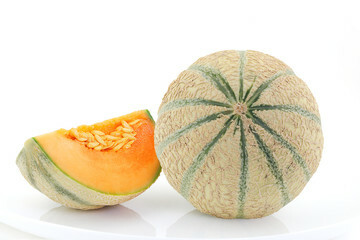Notifications
ALL BUSINESS
COMIDA
DIRECTORIES
ENTERTAINMENT
FINER THINGS
HEALTH
MARKETPLACE
MEMBER's ONLY
MONEY MATTER$
MOTIVATIONAL
NEWS & WEATHER
TECHNOLOGIA
TV NETWORKS
VIDEOS
VOTE USA 2026/2028
INVESTOR RELATIONS
COMING 2026 / 2027
ALL BUSINESS
COMIDA
DIRECTORIES
ENTERTAINMENT
FINER THINGS
HEALTH
MARKETPLACE
MEMBER's ONLY
MONEY MATTER$
MOTIVATIONAL
NEWS & WEATHER
TECHNOLOGIA
TV NETWORKS
VIDEOS
VOTE USA 2026/2028
INVESTOR RELATIONS
COMING 2026 / 2027
 Meenal Kulkarni -
October 18, 2024 -
Personal -
agriculture
muskmelon
muskmelon seed
-
556 views -
0 Comments -
0 Likes -
0 Reviews
Meenal Kulkarni -
October 18, 2024 -
Personal -
agriculture
muskmelon
muskmelon seed
-
556 views -
0 Comments -
0 Likes -
0 Reviews

Muskmelons, also known as cantaloupes, are a popular fruit worldwide, appreciated for their sweet, juicy taste and nutritional benefits. The muskmelon seed market has seen significant changes as the demand for fresh produce increases, particularly in health-conscious and organic farming markets. Understanding current trends in muskmelon seed varieties and consumer preferences helps farmers, distributors, and retailers align their offerings with market demand. This blog explores the latest market trends in muskmelon seeds and highlights what consumers want regarding this summertime favorite.
Muskmelons are among the most widely grown fruits, particularly in tropical and subtropical regions. Their popularity stems not only from their flavor but also from their health benefits. Rich in vitamins A and C and antioxidants, muskmelons are an excellent addition to a balanced diet. As consumers shift toward healthier food choices, muskmelons have found their place among highly demanded fruits. This has, in turn, impacted the seed market, with a surge in demand for specific varieties catering to commercial and home gardeners.
These trends reshape the muskmelon seed market, pushing seed producers to innovate and provide solutions that meet consumer expectations and environmental challenges.
As muskmelon popularity grows, the demand for different seed varieties has expanded. Farmers and gardeners are interested in high yields and other factors such as disease resistance, flavor profiles, and adaptability to specific climates. Here are some of the most prominent trends in muskmelon seed varieties.
One of the most vital trends in the muskmelon seed market is the growing demand for organic and non-GMO seeds. Consumers are increasingly concerned about the environmental impact of conventional farming practices and the health implications of consuming chemically treated produce.
For those looking to start organic farming or expand their home garden, it’s essential to purchase muskmelon seeds that are certified organic and non-GMO. This ensures you meet market demand for cleaner, healthier produce.
Another emerging trend is the development and use of disease-resistant muskmelon seeds. Diseases like powdery mildew, downy mildew, and fusarium wilt are common threats to muskmelon crops. As a result, seed companies are focusing on creating varieties that can withstand these challenges, reducing the need for chemical interventions.
These disease-resistant varieties help farmers reduce crop loss, lower production costs, and meet the growing consumer demand for sustainable and resilient produce.
Muskmelons are grown in various climates, from tropical regions to cooler temperate zones. Seed companies increasingly focus on developing climate-specific muskmelon varieties that can thrive in different environmental conditions. This trend aligns with the consumer preference for locally grown produce and extends the growing season for farmers.
Farmers can ensure a consistent harvest by choosing climate-adapted muskmelon varieties and providing consumers with fresh, regionally grown melons throughout the season.
In addition to the technical aspects of seed development, consumer preferences play a critical role in shaping the muskmelon seed market. Today's consumers are more informed and selective about the food they consume, leading to increased demand for certain qualities in muskmelon.
The primary factor driving consumer preferences for muskmelons is flavor. Consumers seek out muskmelon varieties that are consistently sweet, aromatic, and flavorful. Seed producers respond by developing varieties that enhance these traits while maintaining the fruit’s natural sugar content.
Smaller muskmelon varieties are becoming increasingly popular, especially among consumers who value convenience. Compact varieties are easier to handle, store, and consume, making them ideal for smaller households or individuals looking for a refreshing snack.
As consumers become more aware of the environmental impact of food production, sustainability, and ethical farming practices have emerged as primary considerations in purchasing decisions. Many consumers now seek muskmelon varieties grown using organic or sustainable methods, prioritizing environmentally friendly options.
Looking ahead, the muskmelon seed market is expected to continue evolving, with innovations in seed breeding, organic farming practices, and climate-specific varieties shaping the future of muskmelon cultivation. As consumers become more health-conscious and demand more sustainable food options, the market for muskmelon seeds will likely see an increased focus on disease resistance, flavor enhancement, and adaptability to changing climates.
Instead of concluding with a final thought, it is essential to view the muskmelon seed market as an ever-evolving space driven by innovation and consumer demand. For farmers and gardeners, staying informed about market trends and choosing the right muskmelon varieties is key to staying competitive and meeting the growing demand for high-quality, organic fruits.
Whether you're growing muskmelons for commercial purposes or simply enjoying a fresh harvest in your home garden, staying in tune with the latest market trends will help you make informed decisions that benefit you and your customers.
